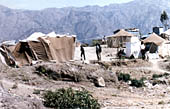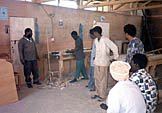
Bearing the African Curse [Archives:1999/03/Law & Diplomacy]
January 18 1999

Why Yemen?
Our shoreline is one open stretch. There are no coastal patrol boats and no coastal garrison are available. The absence of the navy encourages the inflow of unregistered illegal aliens into the country.
In addition, our refugee problem is precipitated by geography. Yemen is situated facing the Horn of Africa, which is going through a very difficult time. There is a civil war in Somalia. There is tension between Ethiopia and Eritrea. There is a long standing civil war in Southern Sudan.

Finally, the humanitarian open-door policy of the government has added fuel to the problem. plus the better economical conditions in Yemen and the presence of UNHCR, all these made Yemen a very attractive place for refugees, to them it is a paradise and a land of opportunities and security.
A clash and a conflict
The In-flux of refugees from Africa to our country because of civil wars there, have a double effect on different aspects of our lives. We look at it from a humanitarian point of view, we fell it is our duty to help them, but how can we help them when we need help? and for how long?.
We should look at it from other angles as well such as social and economical. This in-flux of refuges to Yemen had created a social clash, Yemen was and still is a conservative society many of the refugees are coming from a more or less liberal societies with different ideologies and believes and not knowing much about Yemeni society and its system. These lack of understanding leads to an undesirable and unfavorable misconception causing a social clash between the two societies.
Economically speaking this in-flux increased the lineaments of poverty and its consequences, many of these people come to Yemen looking for jobs believing that Yemen is a better place to start a living or , UNHCR trains these refugees so they can go out of their camps and earn their bread, which lessens the responsibilities of the UNHCR and increases the problems of the country, Yemen is a labour exporting country, we have thousands of unemployed people, the government is not able to create new job opportunities, which means an enormous competition specially in the private foreign companies and service sectors, refugees with their survival instincts are ready to take up any kind of work accepting minimum wages, as a result Yemenis are left jobless on the roads, let alone the spread of diseases which are difficult to control for lake of medical technologies and insufficient financial backing as our officials always like to put it.
What the locals feel?!

“It is our responsibility to help them, as our culture and religion makes it obligatory to help people in need, but at the same time we should not suffer because of this and we should not be depraved of our chances in getting jobs”. Said Mr. Murad( A young unemployed Yemeni).
Mr. Anoushiravan Daneshvar – UNHCR Representative in Yemen feels that refugees help in a way by reducing the labour cost and bring skills to the country. Mr. Fuad(a computer professional) does not agree with the Rep he says ” It is true that they reduce the labour cost, but who is going to benefit from that? Only the businessmen a small part of the community, where the larger part the labour class suffers unavailability and uncertainty of finding gobs to earn their daily bread”.
”We too suffer” Says the refugees.

” We don’t want a special treatment all we want is to be treated like human beings. I don’t want to compare our conditions here with the ones in other countries e.g.; UK. It is going to be a shock to you”. said Mr. Timir.
On asking the UNHCR Representative to clarify the above allegations Mr. Anoushiravan Explained: “The basic policy we follow as for our assistance for refugees is that we should not increase the standard of our services to refugees more than the existing local standards, because that will create tension between the refugees and the locals, because they will look at refugees as a privileged people and the local population living next door not receiving anything so we try to maintain the local standards”.
The question is, Is the food provided to refugees really match the local standards?
Accompany us
the refugees problem is a big one, their number is on the increase every day specially during the period from September – April of every year because of the suitable sea condition. A notable number of these people are young guys between the age group 18 – 30 they are here looking for a better living, a job that can improve there life-styles. The locals feel that they are paying the price of these civil wars in the horn of Africa, the also feel that the International community is not doing enough to solve this problem and they all are of the opinion “If you can not stop a misery try to prevent another one from happening”.
By: Hatem Bamehriz.
Yemen Times
——
[archive-e:03-v:1999-y:1999-d:1999-01-18-p:./1999/iss03/l&d.htm]


